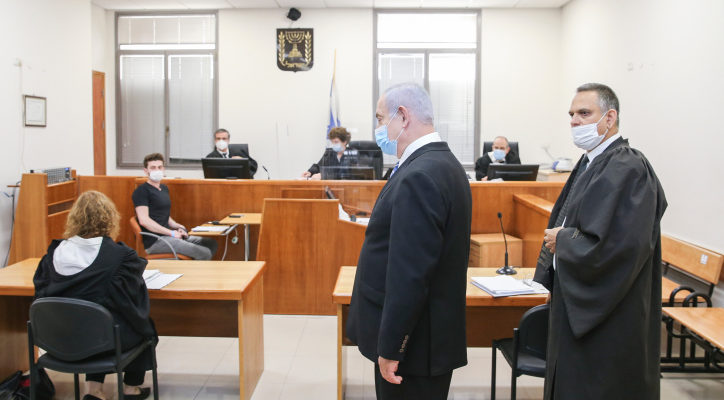Even before the indictments, legal scholars had been troubled by media leaks transforming the proceedings into a “trial by the press.”
By Batya Jerenberg, World Israel News
Israeli media is breaking the law with regard to Prime Minister Benjamin Netanyahu’s court cases and the judiciary is doing nothing to stop it, a lawyer interviewed by Arutz 7 said Tuesday.
“Section 71 of the Courts Law [says that] it is forbidden to publish anything about an ongoing criminal trial with the intention of influencing its results. Awareness that such publicizing can have an impact is already considered an intention to influence,” said Adv. Haya Tamar Harpaz.
The legal term for keeping matters being considered by a court out of the media is sub judice, Latin for “under a judge.”
Allegations against Netanyahu include claims he accepted hundreds of thousands of dollars of champagne and cigars from billionaire friends (Case 1000), offered to trade favors with a newspaper publisher (Case 2000) and used his influence to help a wealthy telecom magnate in exchange for favorable coverage on a popular news site (Case 4000).
With all the leaks that have been published over the years regarding these cases, sub judice has been repeatedly violated, Harpaz said.
She backed up her assertion by referring to an informal opinion written by Prof. Ruth Gavison, a one-time candidate for the Supreme Court.
Writing in a Facebook post right before the 2019 indictments, Gavison said, “I fear that Netanyahu has no chance of getting a fair trial” because of all the media reports of the investigations.
“There has been too much trial by the press…. It’s a tragedy for Bibi but also not good at all for the country and society,” she wrote, referring to the prime minister by his nickname.
Another one of Israel’s foremost legal scholars, Prof. Menachem Mautner, publicly agreed a few weeks later.
“The ongoing leaks concerning the prime minister’s investigations represent a sickening peak in the transfer of the decision-making power on matters of guilt and innocence from the courts to the media,” he wrote in an opinion piece in Haaretz.
Even the fact that in many articles Netanyahu is called “the number one defendant” is problematic, as it violates the principle of equality before the law, Tamar Harpaz said.
“The fact that a prime minister is on trial proves equality, but he cannot be defined as ‘number one’ because everyone is equal before the law,” she argued.
The lawyer also wondered about the seeming access that one journalist, Raviv Drucker, had to certain facts that would be presented in the combined trial, which will begin in earnest after the March elections.
Drucker, who is firmly anti-Netanyahu, has said that in light of the data and evidence he has received, he will hold a “public trial” of the prime minister.
Exposing this evidence to the public is in itself an offense, she said, since investigative materials are supposed to be confidential until the end of a trial.
“It is surprising that the legal system is silent about the violation of its own powers by the media,” Tamar Harpaz said.





